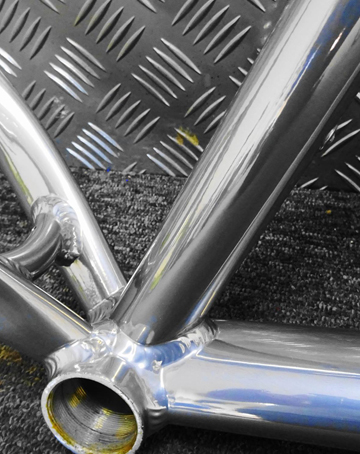Nickel Plating
Nickel plating is a process of depositing nickel onto a metal part. Parts to be plated must be clean and free of dirt, corrosion, and defects before plating can begin. To clean and protect the part during the plating process, a combination of heat treating, cleaning, masking, pickling, and etching may be used. Once the piece has been prepared it is immersed into an electrolyte solution and is used as the cathode. The nickel anode is dissolved into the electrolyte to form nickel ions. The ions travel through the solution and deposit on the cathode.
Benefits of Nickel Plating
Corrosion resistance: a corrosion-prone substance such as iron can be coated with a layer of non-corrosive material, thereby protecting the original material
Applications
Nickel plating is used to coat parts of chemical equipment, automobiles, bicycles, medical instruments, household articles, measuring instruments, engraving plates, and stereotypes, as well as parts that are used under moderate loads under conditions of dry friction.

Tin Plating
Tin is a soft, ductile, silvery-white metal that is not easily oxidized in air. It has good conductivity and corrosion resistance while enhancing solderability of substrates that are not otherwise easily soldered to. Tin is generally considered non-toxic and non-carcinogenic and as such its use is generally approved for food contact applications. Tin’s use can be traced back to 3000 BC when it was first alloyed with copper to make bronze weapons and products.
Tin plating services can be broken up into two primary categories: Bright tin and matte (solderable) tin. Both deposits are electrolytically applied. Bright tin plating has a high degree of luster and is generally preferred for electrical contact applications such as bus bars, terminals and switching components that are not soldered to. If bright tin plating is soldered, the codeposited organics in the deposit can burn, resulting in a dewetting of the solder and a visible charring of the solder joint.
Advantages of Tin Plating
Tin has many strengths making it a desirable choice due to its corrosion protection:
- Fretting, which means surface to surface corrosion.
- Environmental, which refers to sulfur bearing environments that cause tin to tarnish.
- Decent contact resistance and excellent solderability.
- Potential for mirrors like aesthetic.
- Flexibility to use matte tin plating to achieve a dull finish, or bright tin plating when a shinier finish is required
- No known toxicity to life on Earth.
- Tin plating is the lowest cost choice as compared to its rivals up the food chain such as silver plating and gold plating.
Applications Of Tin Plating
Speaking of applications, tin plating has many! Tin's ductility and non-toxic nature, as well as its corrosion resistance, makes it a top choice for food service-related industries, particularly in the manufacturing of fast food equipment, as well as in the production of cookware. Electronics is another industry in which tin plating is pervasive, primarily due to its ability to preserve solderability. As solar power continues to increase in popularity, tin plating has carved out a significant niche in the housing industry.
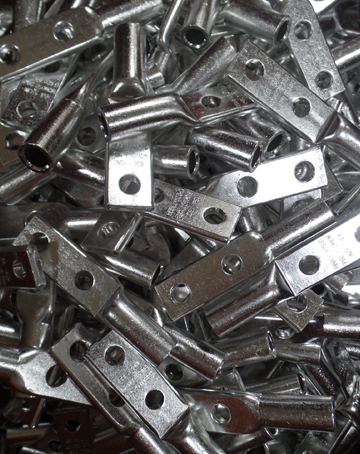
Silver Plating
Silver plating refers to the process of covering a conductive surface with silver to prevent it from corrosion while adding a lustrous shine to it. Silver is a white colored semi precious metal with an oxidizing property. Due to its property of high electrical conductivity it is used in electronics and semiconductor industries. Silver is also an excellent conductor of heat and offers great solderability. It is malleable and has a high degree of Lubricity. Silver finds usage in bearing surfaces and anti-galling applications. Being ductile, it may be bent into any shape and is hence preferred by jewelry and flatware industries for its decorative appeal.
Silver Plating Benifits
- Silver has highest electrical conductivity when compared to all other metals
- Silver has high electrical and thermal conductivity
- Silver is corrosion resistant
- Silver has excellent solderability
- Despite being tarnished easily, silver can be cleaned and polished
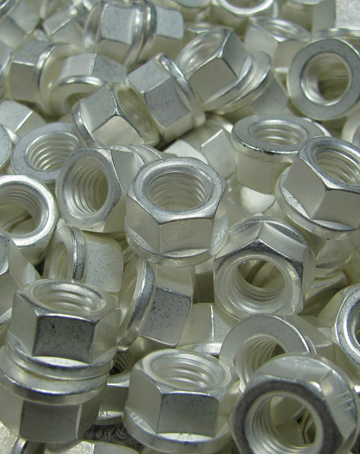
Electroless Plating
Electroless plating, also known as autocatalytic plating, or conversion coating, is a way of plating your part without using an external power source. The process involves placing the part in an aqueous solution and depositing nickel, creating a catalytic reduction of nickel ions to plate the part without any electrical energy dispersal. If your primary goal in plating your parts is to generate corrosion resistance rather than, for example, to beautify the product, electroless plating methods are often a better choice because the resulting plated part tends to be very hard and less porous, thereby more resistant to corrosion. For this reason, electroless plating techniques are very popular in industries where parts are vulnerable to wear and corrosion, such as in oil fields or marine applications.
Electroless Plating Advantages
- Excellent corrosion resistance
- Excellent wear and abrasion resistance
- Good ductility, lubricity and electrical properties
- High hardness, especially when heat-treated
- Good solderability
- Even and uniform thickness even down deep bores and recesses, and at corners and edges
- The coating can be applied as the final production operation and can meet stringent dimensional tolerances
- Can be used on both metallic and non-metallic substrates, provided they have been suitably pre-treated

Matt / Dull Tin Plating
The leading users of tin plating are divided between electronics, mechatronics, hardware, fasteners, food equipment and, most recently, solar. Here are a few examples from each industry: terminals and housings used in avionics, circuit breakers and interconnects used in construction of new homes and buildings, screws, nuts and bolts used on marine hardware in naval vessels, baking sheets and bowls used in food manufacturing and home cookware, and now solar panels.
There are trade-offs to be considered with either finish, and the decision depends on your requirements and preferences. Parts finished with Bright tin provide a shiny, aesthetically pleasing surface finish. It also provides somewhat lower coefficient of friction for mating with other parts, boards and connectors as compared to Matte tin.
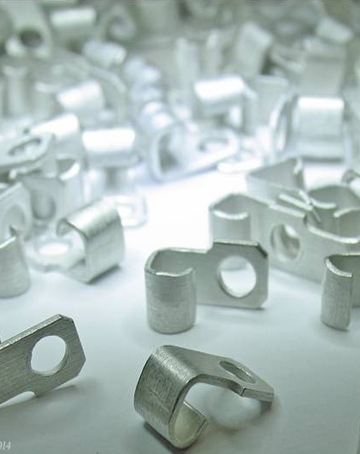
Yellow Chromating
The Yellow Chromate is a yellow/bronze iridescent finish on plated cadmium and zinc. Liquid concentrate is used at 0.5% to 3% by volume in water at 65° to 90°F. The finish has outstanding resistance to salt spray, greatly surpasses the normal 96 hour salt spray resistance specified for yellow chromates on zinc. It will withstand up to 200 hours salt spray. The deposit is a pleasing finish in itself. It is an excellent base for paint. The finish may be dyed to various colors.
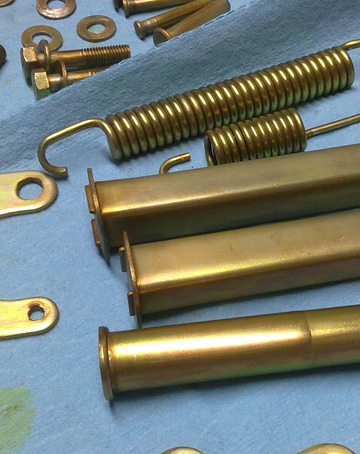
Clear Chromating
Clear chromate is a chemical conversion coating that is applied over zinc plating during the surface coating process. Zinc plating is a soft, ductile, marginally solderable, corrosion-resistant finish. It protects the substrate and corrodes before the base metal, unlike most other commonly plated metals. Clear chromate films are typically very thin, around .000001” and contribute no measurable thickness to the overall coating. Clear chromate has a slight iridescent blue appearance.
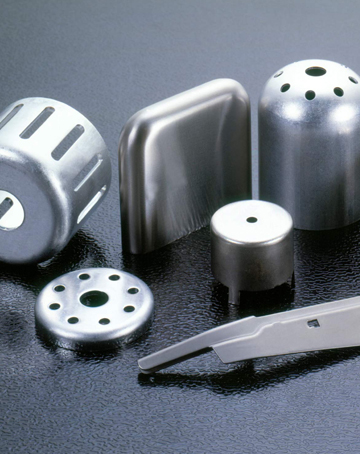
Powder Coating
Powder coating is a type of coating that is applied as a free-flowing, dry powder. The main difference between a conventional liquid paint and a powder coating is that the powder coating does not require a solvent to keep the binder and filler parts in a liquid suspension form. The coating is typically applied electrostatically and is then cured under heat to allow it to flow and form a "skin". The powder may be a thermoplastic or a thermoset polymer. It is usually used to create a hard finish that is tougher than conventional paint. Powder coating is mainly used for coating of metals, such as household appliances, aluminum extrusions, drum hardware and automobile
Powder Coating Benifits & Advantages
- Powder coatings contain no solvents and release little or no amount of volatile organic compounds (VOC) into the atmosphere. Thus, there is no need for finishers to buy costly pollution control equipment. Companies can comply more easily and economically with the regulations of the U.S. Environmental Protection Agency
- Powder coatings can produce much thicker coatings than conventional liquid coatings without running or sagging.
- Powder coated items generally have fewer appearance differences than liquid coated items between horizontally coated surfaces and vertically coated surfaces.
- A wide range of speciality effects are easily accomplished using powder coatings that would be impossible to achieve with other coating processes.
- Curing time is significantly faster with powder coating than with liquid coating.
